Choosing the Right Pet Bird: Key Factors to Consider
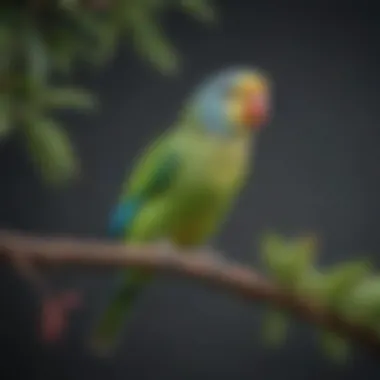
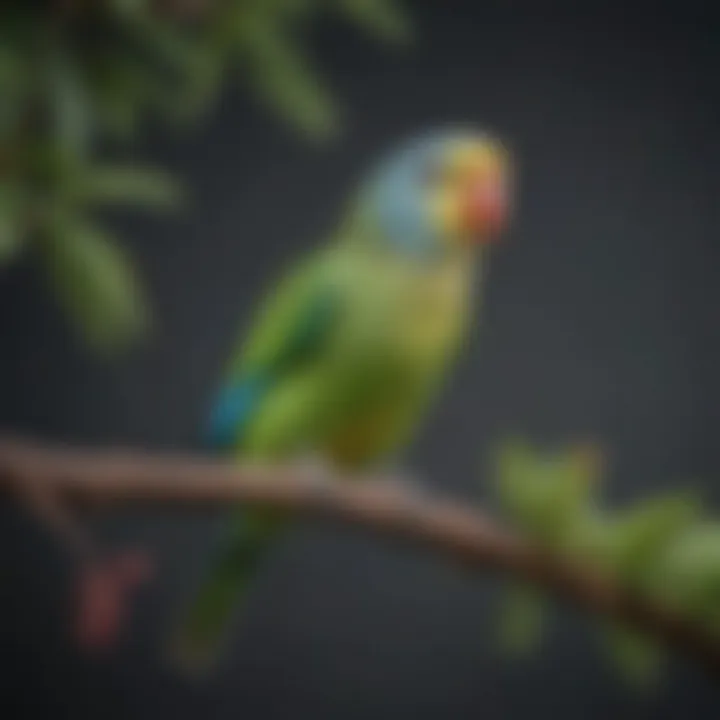
Intro
Choosing a pet bird isn’t as simple as picking a pretty feathered friend. There’s a lot to chew on—like species differences, living habits, and ongoing care requirements. It’s a bit like buying a car; you wouldn’t just look at the color, would you? The same sense of commitment applies to owning a bird. This is where diving deep into the nuances of bird ownership can make a world of difference. Each species has its quirks, and understanding those peculiarities is key to a fulfilling relationship with your avian companion.
Avian Care Basics
When you decide to welcome a bird into your home, you should first grasp the basic needs involved in being a responsible bird owner. This foundation can help ensure that your feathered friend thrives in its new environment.
Importance of Proper Nutrition
Nourishing your pet bird goes far beyond a few seeds thrown into a dish. Different species require distinct diets. For instance, a cockatiel may flourish with a mix of pellets, seeds, veggies, and even occasional treats like small pieces of fruit. On the flip side, a parakeet might need a slightly different balance. It's smart to learn about the nutritional specifics pertinent to your chosen species. Always consult with a vet familiar with avian care.
Understanding Bird Species and Their Needs
Before you jump in, take some time to research various bird species. Each one comes with its own behavioral traits and care requirements. For example, African Greys are known for their intelligence and vocal talent, but they also crave social interaction and mental stimulation. On the other hand, canaries can be more solitary and may not require as much direct interaction. Knowing what to expect can save you from a lot of trial and error.
Basics of Birds Habitat Setup
Setting up a proper habitat is essential. Think of it as creating a cozy corner of the world for your new friend. You’ll need an appropriate cage that’s spacious enough for the bird to move around. Don’t skimp on essentials like perches, toys, and food dishes. Keep in mind that birds love to explore. A safe play area outside the cage is a consideration, too. No bird wants to feel caged up, after all.
Grooming and Hygiene Tips
Birds are usually pretty good at keeping themselves clean, but they benefit from some help too. Regular nail trimming and occasional baths, or even misting them with water, help keep plumage in top shape. Additionally, ensuring their cage is clean is vital for their health. It can feel tedious, but a clean environment helps avoid many health issues.
Interacting with Your Pet Bird
Once you’ve got the basics down, the fun really starts. Building a connection with your bird can become one of the most rewarding experiences.
Building Trust and Connection
Birds can be a bit skittish at first, especially when they’re introduced to a new environment. Gaining their trust will take time. Sit near the cage and talk gently to them; this will help them get used to your presence.
Training Techniques and Tips
Training your bird can be an enjoyable endeavor. Techniques like positive reinforcement can work wonders. Offering treats when your bird does something right can effectively reinforce desired behaviors. Remember, patience is key. Birds might not grasp commands as quickly as dogs, but with consistent practice, they can learn.
Fun Activities for Bird Owners and Their Birds
Get your creativity flowing! There are numerous activities you can do together. Depending on their species, you might teach them simple tricks. Some birds enjoy interactive games. Just keep an eye on their responses and adjust your strategies accordingly.
Recognizing Bird Cues and Behaviors
Understanding your bird's mood can go a long way in enhancing its enjoyment of life. Learn to recognize signs like vocalizations, body language, and even how they move around. These cues can indicate when they’re happy, anxious, or even feeling unwell.
Emotional Well-Being of Birds
Mental health is just as crucial as physical health. Birds are intelligent creatures and need stimulation and companionship to remain happy.
The Role of Play and Socialization
Birds love to play and socialize. Creating opportunities for both can prevent boredom and behavioral issues. Regular interaction and new toys are great ways to keep things lively.
Enhancing Birds' Emotional Health
Consider spending time with your bird daily. Engaging your feathered friend through talking or even singing can help strengthen emotional bonds. You might find it enlightening to see how intuitive birds can be.
Assessing Bird Stress and Remedies
Even the happiest birds can experience stress. Look for signs like feather plucking or excessive vocalization. Identifying triggers, whether it be loud noises or changes in environment, can help reduce stress. Talk to a vet if you're concerned.
Building Strong Human-Bird Bonds
The connection you have with your bird can be profound. Building that bond revolves around trust and understanding. The more time you invest, the stronger the relationship will blossom.
Bird Health and Safety
Like any pet, birds require regular health checks and a safe environment to thrive.
Common Health Issues and Prevention
Birds can face various health problems, including obesity and respiratory issues. A balanced diet and clean habitat can help prevent many ailments. Regular monitoring keeps you one step ahead of potential health crises.
Routine Veterinary Care
Take your bird for annual vet check-ups to catch any health problems early. It’s advisable to find a vet who specializes in avian medicine. A well-informed vet can guide you through the specific needs of your bird.
Environmental Hazards to Avoid
Be aware of common household dangers like toxic plants, fumes from non-stick cookware, and open windows. Birds are sensitive and can easily be harmed by seemingly innocuous situations.
Signs of Illness or Distress
Stay alert for signs that your bird might not be feeling well. Changes in eating habits, lethargy, or abnormal droppings can all signal that something is off. Addressing these problems quickly can save a lot of trouble later.
Fun Facts and Quirky Insights
Birds have fascinated humans for centuries. Here are a few fun tidbits.
Unique Traits of Popular Bird Species
Did you know that cockatoos can live for over 60 years? Or that parakeets can mimic human voices? These quirks make them even more intriguing companions.
Historical and Cultural Significance of Birds
Birds have played significant roles in human culture and history. They often symbolize freedom and have even been used as messengers in wartime.
Famous Bird Owners and Their Stories
Many celebrities have shared their homes with birds. Edgar Allan Poe penned poems about them, while other famous figures have had their unique experiences with their feathered companions. Their stories illustrate the timeless connection humans share with these creatures.
"The only thing cooler than a bird is maybe two birds."
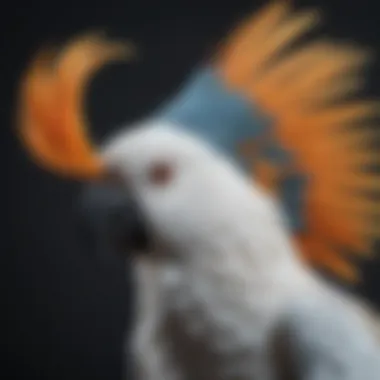
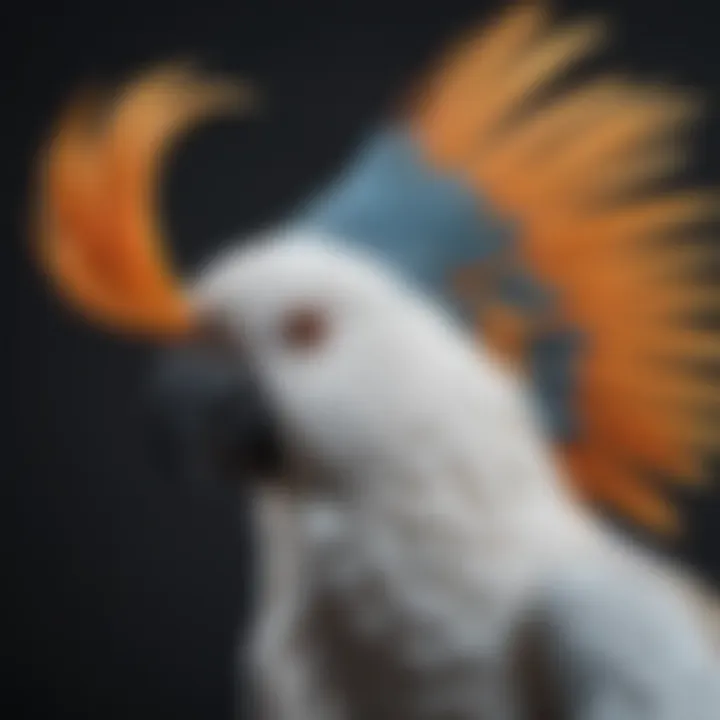
Understanding Pet Bird Species
When deciding on a pet bird, grasping the variety of species is foundational. Not every bird will suit every owner, and knowing the lay of the land can save you a world of trouble down the line. Each species carries its unique traits that affect not just their needs, but how they interact with their human companions. It's sort of like picking a friend—some just mesh better than others with your lifestyle and personality.
A comprehensive understanding of pet bird species helps in determining which ones align well with your preferences, space, and time commitment. Various birds also present differing levels of companionship and care requirements. This section will delve into predominant bird varieties and their individual characteristics to ensure your choice is made with clarity and confidence.
Common Pet Bird Varieties
Parrots
Parrots are perhaps among the most vibrant candidates in the avian world. Their colorful feathers and playful disposition make them highly sought after. One key characteristic of parrots is their intelligence, which can be a double-edged sword.
Having a parrot often means engaging in mental stimulation and social interaction. They thrive on companionship and can easily become bored if neglected—leading to destructive behaviors. Their vocal capabilities vary widely; some species can mimic human speech rather well, making for entertaining conversations. However, their need for attention requires a significant commitment from their owners.
Canaries
On a different note, canaries are cherished for their melodious singing. These small, predominantly yellow birds are often a first choice for those who are leaning towards a simpler, yet rewarding pet. Their enchanting songs can brighten up any room, and their social nature can be quite delightful.
One unique feature of canaries is they are generally low-maintenance and make a great option for first-time bird owners. However, their solitary nature means they can get lonely, so pairing them could be beneficial. Just keep in mind that their songs can become repetitive, which might not suit everyone’s taste.
Finches
Finches are like the friendly neighbors of the bird community. They come in various colors and are social birds that thrive in pairs or groups. Their lively personalities can be a joy to observe, as they often flit around with bursts of energy.
The beauty of finches lies in their cheerful chirping. Though they are not known for their ability to mimic or talk, their communal nature makes them perfect for those who appreciate watching social activity in a cage instead. One downside is they don't particularly enjoy handling as much as parrots, making them less interactive.
Doves and Pigeons
Doves and pigeons often fly under the radar when it comes to pet birds. Their gentle demeanor and serene coos make them appealing to those looking for a calmer presence. They really exude a peaceful vibe, perfect for quieter households.
These birds are relatively low-maintenance, requiring just a simple space to roam and perch. However, their tranquility might not appeal to everyone—especially those hoping for a more engaging pet experience. Doves are also quite social, and having more than one is generally recommended to prevent loneliness.
Identifying Species Characteristics
Size and Lifespan
Recognizing the size and lifespan of potential pet birds factors significantly into your decision. Smaller species, like canaries or finches, tend to have shorter lifespans, while larger birds, such as parrots, can live for decades.
Understanding the size is also crucial for space planning. Large parrots require expansive cages and room to spread their wings, whereas small birds can thrive in more compact settings. The longevity of larger birds makes them more of a long-term commitment, as they need care and attention for many years.
Social Behavior
Social behavior is a defining attribute among bird species. Parrots are known for their sociability, often forming strong bonds with their owners. On the other hand, finches are more about camaraderie among their own kind than with humans. Picking a bird that matches your desire for interaction is necessary for a harmonious relationship.
Additionally, some birds can be quite territorial, which can lead to aggressiveness towards either other birds or humans. This makes it important to do your homework on the species' social dynamics to avoid future conflicts.
Vocalization Patterns
Wouldn't you want to know the chatter level of your future feathered friend? Vocalization patterns vary significantly across species and can affect household dynamics. Parrots are famous for their ability to talk, but this can become overwhelming if you're after peace and quiet. Meanwhile, doves have soft, soothing coos that offer a gentle ambiance.
It's worth noting vocal patterns can impact your daily life, especially if you live in tighter quarters. Choose your species based on your comfort with noise and how much interaction you're willing to entertain.
Assessing Potential Pet Birds
Temperament and Sociability
Temperament can make or break your bird-owning experience. Birds like parrots demand a lot of social interaction, whereas less demanding birds, like canaries, are content with observation. Understanding the temperament will help align your expectations with the bird's needs.
If you thrive on companionship, a sociable bird could mesh well with your lifestyle. Otherwise, opting for a more independent species might make for a less stressful experience. The wrong temperament pairing could lead to frustration for both you and the bird, affecting the overall bond you share.
Exercise and Activity Needs
Every bird has its activity aspirations, and knowing these needs is paramount. Active birds, such as parrots, need plenty of space for flight and playtime to prevent boredom. In contrast, others may do well with smaller living spaces as long as they have a handful of toys.
Understanding exercise needs can also influence how you set up your space and schedule time for your bird's physical activity. Providing enrichment opportunities will help keep your bird healthy and happy, which is just what every pet owner wants.
Choosing the right pet bird involves understanding not just personality and species but ensuring they fit into your lifestyle seamlessly.
Evaluating Lifestyle Compatibility
When it comes to selecting a pet bird, one cannot ignore the intricate dance between one’s lifestyle and the needs of the chosen avian companion. Evaluating how a bird will fit into your daily routine, living situation, and personal preferences is paramount. This ensures not only the well-being of the bird but also leads to fulfilling and harmonious cohabitation.
Personal Schedule and Time Commitment
Daily Interaction Requirements
Daily interaction is the lifeblood of a pet bird’s happiness and health, underscoring that you can’t just swing by to feed them and call it a day. Most birds, especially social species like cockatiels or parakeets, thrive on regular engagement. They need consistent companionship, which brings an undeniable charm to ownership.
The key characteristic here is repetition—birds are creatures of habit. A popular choice that many prospective owners appreciate is the rewarding nature of daily routines. When you engage with your bird each day, it builds trust and deepens the bond. This interaction, simple as it may seem, provides a distinctive sense of security for the bird.
However, be mindful; the downside could be demanding if you’re someone with an unpredictable schedule. Birds can get lonely and may become distressed without adequate companionship. Thus, if you travel often or have fluctuating hours, choosing a bird that necessitates less daily human interaction—such as a canary—might suit your lifestyle better.
Long-Term Engagement
In the long game of bird ownership, long-term engagement rises to prominence. Pet birds, notably larger species like macaws, can live for decades, necessitating a long-term commitment. Understanding their needs isn't just about the initial excitement of bringing a pet home; it also dives into the realm of enduring companionship.
What makes long-term engagement vital is the evolving relationship with your bird. Unlike dogs, which oftentimes can adapt to changes in routine, birds may require a stable environment to thrive. The unique feature of long-term ownership is the adaptability needed on your part. It’s not simply about keeping a pet; it’s about being prepared for life’s many changes while prioritizing your bird's comfort.
On the flip side, the challenge is predicting what your life will look like many years down the line. Careers change, family dynamics shift, and unexpected events occur. Being ready to adapt your living arrangements or your daily habits can be a heavy burden. If you foresee significant changes in the future, perhaps a smaller or more independent bird, like finches, could be a more fitting choice.
Space Considerations
Indoor and Outdoor Spaces
Considering the spaces you can offer to a pet bird is about more than just square footage; it encompasses creating a real habitat that complements their lifestyle. Indoor spaces must be safe and stimulating, while outdoor areas can provide fresh air, which many birds savor.
The key factor here is safety. Building a safe area means ensuring that it’s free from hazards, such as open windows and potential predators. That’s why many folks consider having a designated indoor space as a primary choice for pet birds. It balances security and comfort, creating a sanctuary within your home.
On the downside, opening up your home to an outdoor experience requires vigilance. Birds are naturally inclined to explore, and outdoor enclosures must be robust and secure to prevent escapes or unsafe interactions with other wildlife. The quest for the perfect environment is a factor all prospective bird owners should seriously consider.
Cage Size and Setup


Cage size and setup stand as pivotal components in the overall happiness of a bird. A roomy cage can significantly enhance a bird's quality of life. It allows for movement, exercise, and play, all of which are critical to their well-being.
The unique feature of an adequately sized cage is not just about dimensions but configuration. Perches, toys, and safety features like locking mechanisms are elemental elements in the arrangement. For those looking at larger birds, like African Grey parrots, bigger cages become essential as they need the space to fly and play.
Nevertheless, bigger cages can mean larger initial costs and more extensive cleaning duties. Additionally, the overall placement in your home matters greatly, giving the bird consistent stimulation or quiet time as needed. Therefore, weighing the advantages of improved bird wellness against potential inconveniences or higher expenses is crucial in making an informed decision.
Understanding the Care Requirements
When diving into the world of pet birds, a solid grasp on care requirements is crucial. Owning a bird isn’t just about adding color and melody to your home; it’s a lifestyle commitment demanding attention to their specific needs. Understanding these needs not only enhances the bird's welfare but also enriches the human-animal bond. Care requirements include diet, health monitoring, and overall environmental well-being that go beyond mere feeding and cleaning.
Nutritional Needs
Birds, like any other pets, need a well-rounded diet to thrive. This isn’t just about tossing birdseed into a bowl and calling it a day. A balanced diet forms the backbone of their health and happiness, and understanding the nuances of such diets is key to successful bird ownership.
Seed vs. Pellet Diets
Let’s tackle the debate around seeds and pellets. Many folks might think seeds are an all-star choice because they look colorful and are easily available. However, seeds can be high in fats and low in essential nutrients. Pellets, on the other hand, are designed as complete diets. They are nutritionally balanced to ensure your feathered friend gets all the necessary vitamins and minerals.
Choosing pellets can be beneficial since they prevent selective eating, which is common with seeds. Birds often pick out their favorites and leave the less appealing bits behind. However, pellets can be less enticing for some birds, leading to a bit of fuss during the eating process. Nonetheless, it's worth considering how the right diet can lead to longer and healthier lives for your avian companions.
Fresh Fruits and Vegetables
Next on the plate are fresh fruits and vegetables. These add variety and are packed with essential nutrients. Dark leafy greens, carrots, and even certain fruits like berries can be wonderful additions to a bird's menu. Unlike a boring seed diet, offering a mix of fresh produce can stimulate their taste buds and encourage foraging behavior.
However, introducing new foods can sometimes throw a bird for a loop; some might take longer to accept them. A key point here is to provide a mix of options and a bright palette to entice them to explore different flavors. But remember to avoid avocado and chocolate – those are no-gos for birds!
Health Monitoring
Just as diet is paramount, monitoring your pet bird’s health is vital. Birds are known for hiding illnesses until they’re really bad off, so being attentive to their behavior can save you a heartache down the line.
Recognizing Signs of Illness
Being able to recognize signs of illness is essential for any bird owner. Subtle changes in behavior, such as decreased chirping, fluffed feathers, or a lack of interest in food, can be indicators that something isn’t right. Each bird species has its quirks in behavior, so knowing what's normal for your bird is crucial. Consistent observation and a basic understanding of what symptoms to look for can provide the advantage you need when the unexpected happens.
"A bird's silence can sometimes speak louder than its song."
Regular Veterinary Care
Equally important is establishing a relationship with an avian veterinarian. Regular check-ups are not just a formality; they’re a proactive measure to ensure long-term health. A vet is well-equipped to spot issues before they become major problems, such as feather mites or nutritional deficiencies.
Some potential bird owners might balk at veterinary costs, but consider it an investment in your pet’s future. Regular care often means a longer, healthier life, ultimately benefiting both the owner and the pet. Bird ownership is a journey that beautifully intertwines care, companionship, and commitment, and understanding the intricacies within these areas can pave the way for meaningful experiences with your feathered friends.
Exploring Emotional Bonds
Emotional connections with pet birds can significantly enrich the ownership experience. It transcends the simple act of feeding and cleaning; it dives into the foundations of companionship and loyalty. Understanding how to cultivate these bonds is paramount not just for the enjoyment of the pet owner, but for the well-being of the bird itself. A well-bonded bird is often more confident, happier, and can exhibit fewer behavioral issues compared to those that feel isolated.
Developing Relationships with Birds
Creating a meaningful relationship with a pet bird requires time and effort but pays off in myriad ways.
Trust Building Techniques
When it comes to trust building, one of the simplest yet most effective methods is consistent, gentle handling. Birds are inherently cautious creatures. They rely on instinct, and any sudden movement or loud noise can send them soaring away, quite literally! Calmly interacting with your bird, using soft tones, and providing treats can initiate the process of trust.
The key characteristic of trust building is patience. Unlike dogs that often crave human attention, many birds benefit from a more measured approach to social interactions. Establishing trust helps in creating a safe environment where the bird feels secure, potentially leading to a joyful pet-owner bond.
A unique feature of these techniques is their adaptability. You can tailor them based on the bird species. For instance, some species may prefer one-on-one time, while others may enjoy being part of group activities. Various environmental factors such as lighting and noise level also play a part in a bird’s responsiveness.
Advantages: Trust building can lead to a relaxed bird that is easier to handle.
Disadvantages: On the flip side, if not approached correctly, some methods may backfire, leading to fear or anxiety.
Understanding Bird Body Language
Birds communicate largely through body language. Recognizing their signals can enhance the emotional bond between you and your feathered companion. A bird’s posture, feather positions, and even eye movements convey feelings and states of mind. For example, a puffed-up bird might be feeling threatened, while a relaxed, preening bird is typically content.
The key characteristic here is observation. Being vigilant about your bird's non-verbal cues creates pathways for better interaction. Understanding body language is beneficial not just for building trust but also for addressing potential issues before they escalate.
The unique aspect of this understanding is that it provides owners with a more profound insight into their pet's emotional state, fostering a stronger relationship.
Advantages: Astronomy of bird behavior means you can respond appropriately, increasing their comfort levels and overall well-being.
Disadvantages: On the downside, misinterpretation can lead to incorrect handling and stress for the bird.
Social Needs of Pet Birds
Pet birds are not solitary creatures; they thrive on interactions, whether it’s with humans or other birds.
Interactions with Humans
Positive interactions with humans are essential for a bird’s mental and emotional health. Engaging in daily conversations, singing, or simply being near your bird enhances their social needs. Instead of viewing a bird as merely a pet, owners should see them as interactive companions.
One key characteristic of these interactions is the element of play. Engaging in toy activities or introducing new challenges can stimulate the bird’s mind and help combat boredom. This motivates the bird to interact more closely with you, ultimately leading to stronger emotional bonds.
Moreover, regular interactions can ease the bird’s social anxiety, leading to a more confident pet. While it may take time, birds that receive adequate human engagement tend to be more cheerful and less prone to behavioral issues.
Advantages: Improved emotional health and bonds can result in fewer issues like feather plucking.
Disadvantages: But, neglecting this interaction can result in stress and aggression.
Companion Birds and Multi-Bird Households
Adding multiple birds into the mix can fulfill their social needs even further. For those considering becoming multi-bird householders, understanding the dynamics of companionship is crucial. Birds often form bonds with each other that can satisfy their social instincts. This can relieve the owner from feeling solely responsible for the bird's socialization.
A prominent characteristic of companion birds is their tendency to engage in social behaviors such as preening each other and vocalizing together. These interactions illuminate the social nature of birds and negate feelings of loneliness. Multi-bird environments can showcase lively interactions that bring joy.
However, it’s vital to note that not all species get along well. Certain birds may exhibit territorial behaviors, and some may need time to adjust to newcomers. Still, the benefits of companion birds often outweigh the challenges when carefully planned.
Advantages: Better mental stimulation and happiness for the birds.
Disadvantages: The possible introduction of conflicts may require vigilant supervision and management.
Financial Considerations
When it comes to selecting a pet bird, financial considerations play a significant role in ensuring that you’re adequately prepared for the responsibilities that lie ahead. Not only do initial investments matter, but ongoing maintenance expenses must also be factored into your decision-making process. Understanding these costs can help potential bird owners avoid financial strain and create an ideal environment for their new feathered friend.
Initial Purchase and Setup Costs
Cage and Accessories
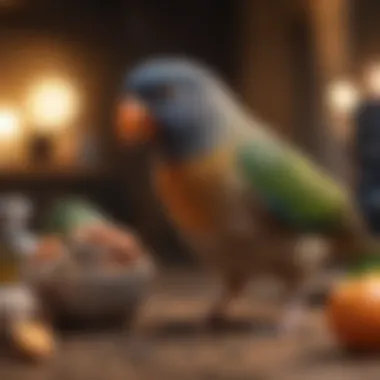
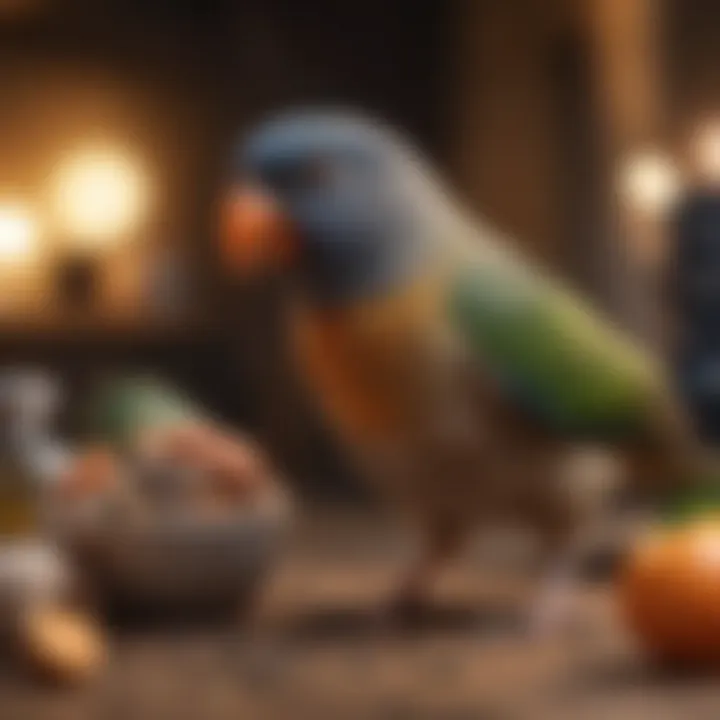
Investing in a quality cage and accessories is one of the primary expenses when acquiring a pet bird. It's not just about choosing something that looks pretty; you're aiming for a safe and comfortable living space that caters to the specific needs of your bird. An appropriate cage must be spacious enough for your bird to spread its wings and move around freely. Many owners find that aquiring a cage with additional features like removable trays for easy cleaning and multiple perches enhance both the owner’s and bird’s experience.
For instance, a Dometic Birdcage is often regarded for its durable materials and spacious design. However, it's important to note that high-quality cages can be a bit pricey, reaching upwards of a few hundred dollars. Therefore, it may require some diligent budgeting. While a lower-priced option might seem appealing, it’s crucial to consider the long-term durability and safety for your bird.
In addition to the cage, there are accessories such as toys, food and water containers, and perches to think of. Since birds are known for their curious nature, engaging toys are invaluable for their mental stimulation. Making sure that all accessories are safe and suitable, can sometimes hold additional costs.
First Veterinary Checkup
Another substantial initial expense is the first veterinary checkup. This visit is essential for establishing your bird's health baseline and identifying any existing health issues. A well-informed veterinarian can also guide you on dietary needs and recommend vaccinations. Paying attention to this aspect of pet ownership can save you a heap of troubles down the line.
The unique feature of this first visit is that it gives you peace of mind. Knowing that your avian companion is fit as a fiddle can ease anxieties and help set a positive tone for your new relationship. However, keep in mind that vet visits can vary widely in their costs, depending on location, the species of bird, and the specific checkup procedures involved.
Ongoing Maintenance Expenses
Food and Supplies
An ongoing, often overlooked, expense is the cost of food and supplies. Birds require a balanced diet that consists of high-quality pellets, seeds, fresh greens, and fruits. When looking at this aspect, one must understand that birds are not just animals — they are very much entitled diners! Investing in nutritionally rich food can result in a healthier bird and potentially lower veterinary costs down the line.
For instance, brands like Harrison's Bird Foods and Kaytee offer specially formulated nutrition which can be beneficial. Yet, make sure to evaluate if these options align with your financial plan. Additionally, don’t forget about the costs for replacement supplies - like perches that wear down, cleaning supplies, and towels for their cages, all add up rather quickly.
Healthcare Costs
Healthcare costs tend to be one of the more significant ongoing expenses incurred throughout your bird’s life. Whether it’s regular check-ups or treating illnesses, budgeting for healthcare is vital. Regular vet visits, even if your bird seems perfectly healthy, help in preventing potential issues from becoming serious. Birds often hide their illnesses, making such check-ups crucial.
It's also worth noting that certain species are prone to specific health issues, which can attract additional costs. For instance, African Grey Parrots might need specialized care, as they can be more susceptible to diseases like Psittacine Beak and Feather Disease. Planning for unexpected vet visits can cushion the blow to your financial resources.
In essence, understanding financial responsibilities involved in pet bird ownership is crucial. Adequate planning will contribute to a happy, healthy environment for both the bird and the owner.
Taking these details into account can help potential bird owners like yourself prepare adequately, leading to a long-lasting and fulfilling relationship with your feathered friend.
Choosing the Right Environment
When selecting a pet bird, creating a suitable environment is paramount. The environment can define the health, behavior, and overall happiness of your avian companion. Ensuring that the habitat matches the specific needs of the bird species you're considering is a key element in creating a lasting bond.
Environment encompasses more than just a cage; it includes factors like temperature, humidity, and the materials used for perches and toys. Birds, being sensitive creatures, thrive in settings that mirror their natural habitats as closely as possible. Not only does this ensure their physical well-being, but it also plays a considerable role in their emotional state and sociability.
Climate and Temperature Needs
Indoor Heating/Cooling
Maintaining the right indoor temperature is crucial for your bird’s health. Birds, particularly from tropical climates, can be quite sensitive to temperature fluctuations. A stable environment that stays between 65°F to 75°F is often ideal, as it mimics their natural habitats.
One key characteristic of heating and cooling systems for pet birds is the ability to regulate temperature without causing drafts. It's essential to position their cages away from direct airflow—from air conditioners or heaters—since abrupt changes can stress them. Moreover, using a thermostat will help maintain the room within the desirable range, making it a popular choice among bird owners.
Each bird owner may encounter unique challenges in keeping their pet comfortable which can require specific solutions, such as bird-safe heaters or fans. However, poorly insulated spaces can lead birds to experience temperature shifts that could create uncomfortable or even harmful conditions for their well-being.
Humidity Levels
Humidity is another crucial aspect not to be neglected. Birds can usually handle a range of humidity levels, but they often prefer a relative humidity of 40% to 60%. This range is important for their respiratory health and feather condition. A humidifier can be a great addition to keep moisture levels stable, especially during dry seasons or in air-conditioned rooms.
High humidity, however, can lead to mold and respiratory issues, while low humidity may result in dry skin and feather problems. Therefore, monitoring humidity levels using a hygrometer can be a beneficial measure. It provides insight and allows for adjustments to maintain optimal conditions for your bird’s health.
Perches and Toys
Selecting Safe Materials
When it comes to perches and toys, ensuring they are made from safe materials is crucial. Not all wood types are suitable for birds; some may contain toxins that can harm them. Therefore, selecting perches made from natural, untreated woods is typically a wise choice. Look for materials such as maple, pine, or manzanita, as they can often be safe and less likely to splinter.
The importance of using safe materials cannot be overstated because birds are curious creatures that tend to chew on everything. The inclusion of appropriate perches can significantly aid in keeping your bird’s feet healthy and exercised. This contributes to their overall physical condition, and creates a more engaging living space.
Stimulating Activities and Toys
Birds are intelligent and need mental stimulation to prevent boredom. Incorporating engaging activities and toys into their environment can be vital. From swings to foraging toys, the variety available can nurture their natural instincts and keep them mentally sharp.
A key characteristic of stimulating toys is their ability to entertain while promoting exercise. Look for toys that involve problem-solving, such as those that require the bird to manipulate certain parts to retrieve treats. Not only does this keep them busy, but it can also foster a sense of accomplishment.
In summary, choosing the right environment is not simply a matter of aesthetic appeal or convenience. It fundamentally affects your bird’s health and happiness. A safe, comfortable, and engaging setting creates the ideal backdrop for a fulfilling relationship between bird and owner.
Long-Term Commitment to Bird Ownership
Choosing a pet bird isn't a trivial decision. It's a commitment that can span years, often exceeding a decade. Therefore, understanding the long-term responsibilities associated with bird ownership is crucial. Pet birds can become a central part of your life, and neglecting their needs can lead to serious consequences for their health and well-being. Knowing that these creatures can live for a long time helps potential owners reflect on whether they can provide the love and care they need throughout their lifespan.
Understanding Lifespans
Committing to a Decade or More
When you think about bringing a bird into your home, it’s important to grapple with the fact that many species can live for a decade or more. Parrots, for example, have impressive lifespans—some living over 30 years! This kind of longevity can be both a blessing and a challenge. The key characteristic of this commitment is that it requires consistent attention and care, much like raising a child.
Why is this commitment a beneficial choice? Because it allows for deep emotional bonds to form between the owner and the bird. Birds, unlike many pets, develop personalities and quirks, often becoming beloved companions. However, it also requires prospective owners to account for their own changing life circumstances. For instance, an owner who commits to caring for a bird during their 20s might find that their lifestyle shifts drastically when they start a family or move for a new job.
The unique feature here is that birds thrive on routine and stability. This might result in some owners feeling stressed or guilty if life changes impede the level of care they can provide. Balancing personal growth while offering committed companionship to a long-lived pet is key.
Planning for End-of-Life Care
One aspect often overlooked in pet ownership is making plans for end-of-life care. Understanding that your feathered friend won’t live forever can be quite a sobering thought. Planning for the end of a bird's life should never be viewed as a morbid task. Instead, it’s a responsible way of crafting a loving farewell.
The critical aspect here is to ensure that you've thought through how to manage the passing of your pet. This might include understanding the potential for health issues associated with aging species, or even deciding how to approach their passing with dignity. It is considered a beneficial choice to have a plan in place, including discussing health options with veterinarian. This preparation can ease the emotional burden not only on the owner but also on the pet.
Part of this involves acknowledging the unique features of pet bird end-of-life care, such as potential hospice options for avian companions. Making arrangements ahead of time can allow for a smooth transition, preserving the cherished memories you share together.
Adapting to Changing Needs
Life Changes and Their Impact
Life has a way of throwing curveballs at us. The impact of life changes—such as marriage, moving, or having children—can't be overstated when it comes to your pet bird. Understanding the consequences of these changes is essential to ensuring a stable environment for your feathered friend.
Key here is adapting and being flexible. Birds, while resilient, do notice changes in their surroundings. A beneficial approach is setting routines during significant adjustments, allowing your bird to feel secure amidst the chaos.
On the other hand, the unique challenge lies in the fact that some birds may not take well to sudden changes. An owner who brought a lovebird into their home will need to ensure that its social needs are met, regardless of whether life gets busier.
Updating Living Conditions
Another aspect of long-term commitment is updating living conditions for your bird. Over time, your living space may change due to various reasons. Perhaps a family expansion requires moving to a larger home, or maybe you need to downsize.
The key characteristic of updating living conditions lies in the importance of keeping the environment safe and stimulating, ensuring that it meets your bird's physical and mental needs. It’s a beneficial practice to remodel their space, introducing new toys, perches, or even designing a safe outdoor area if possible.
However, it's worth noting that updating their living conditions can sometimes be disruptive. A sudden change in habitat may confuse or stress your bird. Thus, introducing changes gradually allows them to acclimate more comfortably. It’s a delicate balancing act, but ultimately worth the effort for a happy and healthy pet.















